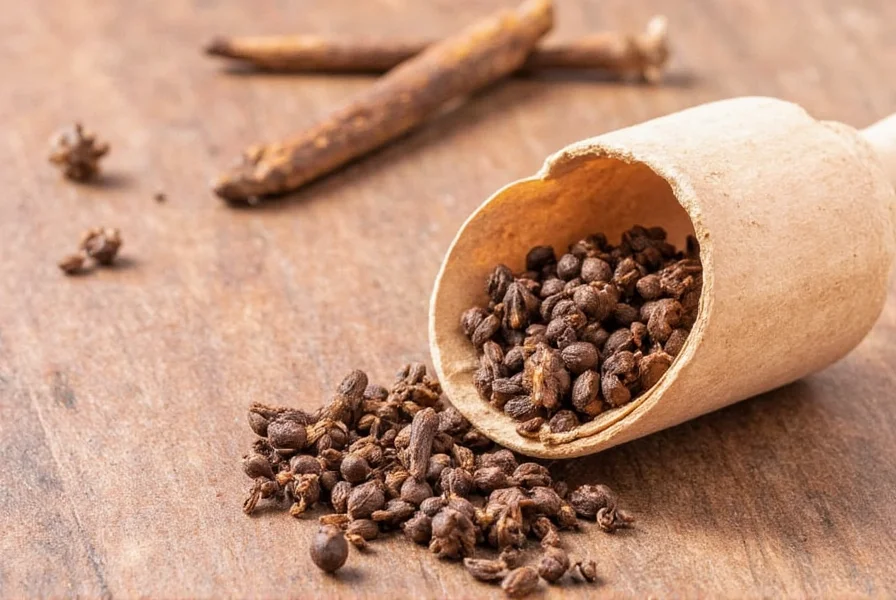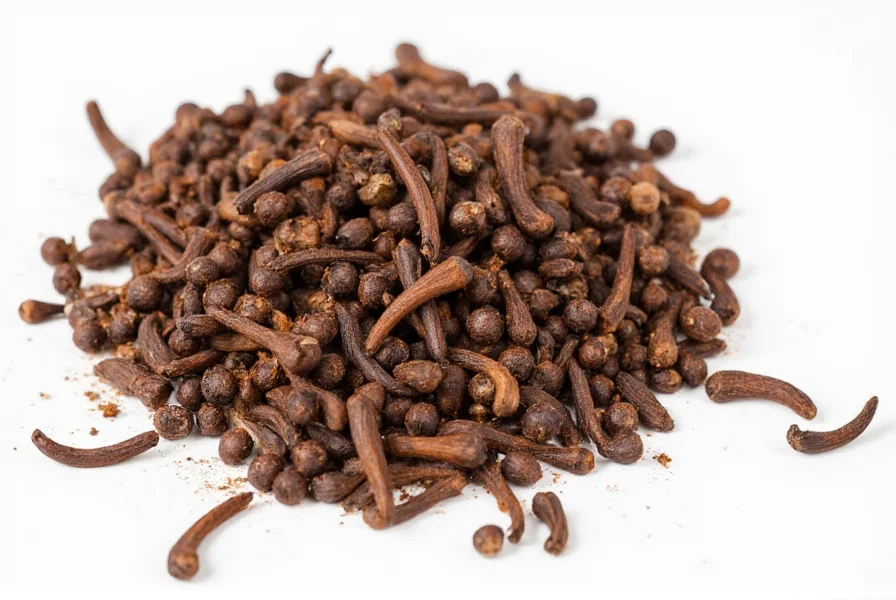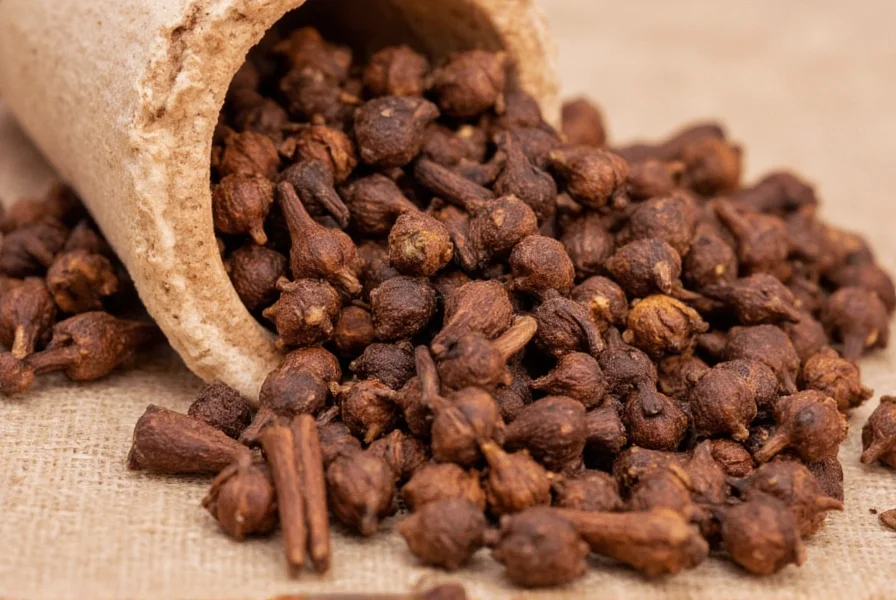Cloves (Syzygium aromaticum) are more than just a holiday spice—they're a nutritional powerhouse with impressive health benefits backed by scientific research. These dried flower buds from the clove tree contain a remarkable concentration of bioactive compounds that contribute to their therapeutic effects. Let's explore the evidence-based benefits of incorporating cloves into your wellness routine.
Nutritional Powerhouse: What Makes Cloves Special
Understanding the nutritional profile of cloves explains why they deliver such significant health benefits. Just one tablespoon (about 6 cloves) provides:
| Nutrient | Amount per Tbsp | Percent Daily Value |
|---|---|---|
| Calories | 21 | 1% |
| Fiber | 1.1g | 4% |
| Manganese | 0.6mg | 26% |
| Vitamin K | 6.6mcg | 6% |
| Vitamin C | 2.3mg | 3% |
The star compound in cloves is eugenol, making up 70-90% of clove essential oil. This phenolic compound gives cloves their distinctive aroma and delivers most of their therapeutic benefits. Cloves also contain significant amounts of flavonoids like kaempferol and rhamnetin, plus triterpenoids including oleanolic acid—all contributing to their impressive antioxidant capacity.
Scientifically Supported Health Benefits of Cloves
Powerful Antioxidant Protection
Cloves rank among the highest antioxidant foods according to the ORAC (Oxygen Radical Absorbance Capacity) scale. Research published in the Journal of Agricultural and Food Chemistry found cloves have 30 times more antioxidants than blueberries. These compounds neutralize free radicals that cause cellular damage, potentially reducing the risk of chronic diseases including heart disease and certain cancers. The high antioxidant content in cloves helps protect against oxidative stress, which contributes to aging and various degenerative conditions.

Natural Anti-Inflammatory Effects
The eugenol in cloves demonstrates significant anti-inflammatory properties. A 2018 study in Phytotherapy Research showed that eugenol reduced inflammatory markers in human cells by inhibiting the COX-2 enzyme—similar to how some non-steroidal anti-inflammatory drugs (NSAIDs) work, but without the side effects. Regular consumption of cloves may help manage chronic inflammation associated with conditions like arthritis, metabolic syndrome, and cardiovascular disease. Understanding how cloves reduce inflammation can help those seeking natural approaches to managing inflammatory conditions.
Oral Health Benefits and Dental Applications
For centuries, traditional medicine has used cloves for dental pain relief, and modern research confirms their effectiveness. The American Dental Association recognizes clove oil as a temporary remedy for toothaches due to its analgesic and antibacterial properties. A clinical trial published in the Journal of Dentistry found that clove gel provided pain relief comparable to benzocaine for minor dental procedures. Cloves combat oral pathogens that cause cavities and gum disease, making them valuable for maintaining oral hygiene. Many people search for natural remedies for tooth pain, and cloves offer a scientifically supported solution for temporary dental discomfort.
Blood Sugar Regulation Support
Emerging research suggests cloves may help regulate blood sugar levels. A 2019 animal study in the Journal of Nutrition and Metabolism demonstrated that clove extract improved insulin sensitivity and reduced blood glucose levels in diabetic rats. The compound nigericin in cloves appears to enhance glucose uptake by cells. While human studies are still limited, these findings suggest cloves could be a beneficial addition to dietary approaches for managing type 2 diabetes. People researching natural ways to support healthy blood sugar levels should consider the potential benefits of cloves as part of a comprehensive approach.
Liver Protection Properties
Cloves show promise in protecting liver health. Research in the Journal of Immunotoxicology found that eugenol reduced oxidative stress and improved liver function in animals with liver damage. The antioxidants in cloves help the liver detoxify harmful substances and may reduce the risk of non-alcoholic fatty liver disease (NAFLD). Regular, moderate consumption of cloves appears to support liver enzyme function and protect against toxin-induced damage.
Natural Antimicrobial and Antifungal Effects
Cloves possess broad-spectrum antimicrobial properties. Studies show clove oil effectively inhibits the growth of various bacteria including E. coli and Staphylococcus aureus, as well as fungi like Candida albicans. This makes cloves valuable for food preservation and potentially for addressing certain infections. The antimicrobial properties of cloves explain why they've been used historically as a natural preservative and why they remain relevant in natural approaches to fighting infections.
How to Use Cloves for Maximum Health Benefits
To incorporate cloves into your wellness routine:
- Add whole cloves to broths, stews, and rice dishes (remove before serving)
- Make clove tea by steeping 2-3 whole cloves in hot water for 10 minutes
- Use clove essential oil diluted with carrier oil for topical applications
- Add ground cloves to smoothies, oatmeal, or baked goods
- Chew a single clove for temporary toothache relief
For dental applications, dilute 2-3 drops of clove oil in a teaspoon of carrier oil like coconut oil and apply to the affected area. When using clove oil topically, always perform a patch test first as some people may experience skin irritation.
Potential Side Effects and Precautions
While cloves are safe when consumed in culinary amounts, higher therapeutic doses require caution:
- Excessive consumption may cause mouth irritation or digestive upset
- Clove oil should never be used undiluted on skin or gums
- People with bleeding disorders should consult a doctor before using cloves medicinally
- Pregnant women should avoid medicinal doses of cloves
- Cloves may interact with blood-thinning medications
The European Medicines Agency recommends no more than 2.5mg of eugenol per kilogram of body weight daily. For most adults, this translates to approximately 5-10 whole cloves per day for therapeutic use. Understanding proper clove dosage is essential for safely experiencing the health benefits of cloves without adverse effects.

Conclusion: Harnessing the Power of Cloves
Cloves represent one of nature's most potent medicinal spices with a growing body of scientific evidence supporting their traditional uses. From their impressive antioxidant capacity to their proven benefits for oral health and potential role in blood sugar management, these small but mighty buds offer significant health advantages. When used appropriately and in moderation, cloves can be a valuable addition to a holistic approach to wellness. As research continues to uncover new applications for this ancient spice, its status as a functional food with therapeutic potential becomes increasingly clear. Whether you're exploring natural remedies for tooth pain or seeking ways to boost your antioxidant intake, understanding the evidence-based benefits of cloves can help you make informed decisions about incorporating them into your health regimen.
Frequently Asked Questions
What are the most scientifically proven benefits of cloves?
The most scientifically supported benefits of cloves include their potent antioxidant properties, anti-inflammatory effects, and oral health benefits. Research confirms that the eugenol in cloves provides effective temporary relief for toothaches and fights oral pathogens. Cloves also demonstrate promising effects on blood sugar regulation and liver protection in preliminary studies, though more human research is needed in these areas.
How can I use cloves for toothache relief?
For temporary toothache relief, gently chew one whole clove and place it near the painful tooth, or mix 2-3 drops of clove oil with a teaspoon of carrier oil (like coconut oil) and apply to the affected area using a cotton swab. The eugenol in cloves acts as a natural anesthetic and antibacterial agent. Note that this provides only temporary relief and you should see a dentist for persistent tooth pain.
Can cloves help lower blood sugar levels?
Preliminary research suggests cloves may help regulate blood sugar. Animal studies show clove extract improves insulin sensitivity and reduces blood glucose levels. The compound nigericin in cloves appears to enhance glucose uptake by cells. While promising, human studies are limited, so cloves should be considered a complementary approach rather than a primary treatment for diabetes. People with diabetes should consult their healthcare provider before using cloves medicinally.
Are there any risks associated with consuming cloves?
Culinary amounts of cloves are generally safe for most people. However, excessive consumption can cause mouth irritation, digestive upset, or liver damage in sensitive individuals. Clove oil should never be used undiluted. People with bleeding disorders or those taking blood-thinning medications should consult a doctor before using cloves medicinally, as eugenol may increase bleeding risk. Pregnant women should avoid medicinal doses of cloves.
How much clove is safe to consume daily?
For culinary use, 2-4 whole cloves per day is generally considered safe. For therapeutic purposes, the European Medicines Agency recommends no more than 2.5mg of eugenol per kilogram of body weight daily, which translates to approximately 5-10 whole cloves for most adults. When using clove oil, dilute 1-2 drops in a carrier oil. Always start with lower amounts to assess tolerance, especially if using cloves for health benefits rather than just flavoring.











 浙公网安备
33010002000092号
浙公网安备
33010002000092号 浙B2-20120091-4
浙B2-20120091-4